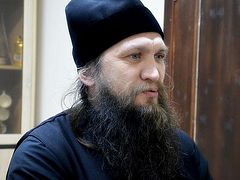Igumena Domnika (Korobeinikova) is the abbess of the St. Alexander Nevsky Novo-Tikhvin Monastery in Ekaterinburg. In this conversation, the abbess reminds us of how our faith should manifest in the simplest, ordinary circumstances, and in the trials sent to us by the Lord.
 Abbess Domnika (Korobeinikova)
Abbess Domnika (Korobeinikova)
At the beginning of the conversation, I would like to recall an interesting historical example that St. Nikolai (Velimirović) discussed. He talks about the great conqueror Alexander the Great, who was a most talented military commander. He achieved many victories despite the fact that his army was often much smaller than the enemy’s. In wars with Persia, he won even when the Persian armies were three or four times larger. And St. Nikolai explains how Alexander the Great managed to win such victories. This is what he writes: “Alexander the Great defeated the Persian hordes only because he armed his soldiers with spears longer than those of the soldiers of Darius, the Persian king.”
St. Nikolai used this example to arouse zeal in his spiritual children. He would say that a Christian is also a soldier, and in order to win spiritual victories, they must also be armed like the soldiers of Alexander the Great. This is what he taught:
King Alexander’s soldiers’ spears were longer than those of the enemies. So our Christian weapons—faith, goodness, mercy, and the rest—must be more powerful and longer-reaching than any of the weapons of this world.
What kind of weapon is this? It is faith in the Lord Jesus Christ and in eternal life. And the weapons of this world are everything that the world attracts people with—for example, the love of convenience and pleasures, the desire to be in charge, the desire to surpass others with your talents or mind and knowledge at all costs. With these weapons, the world conquers the soul. And these weapons can strike even Christians if they are poorly armed. Therefore, we are called in faith to be more zealous than scientists, for example, who believe in their science and thirst for new discoveries; to be more diligent than people who believe only in earthly happiness and seek pleasure in everything in this life; than those who believe in atheism, which is in fact a faith as well, but a faith that recognizes only the material in man. Our faith must be stronger than all these “faiths!”
For us, it’s not enough simply to confess ourselves as Christians and formally fulfill everything that’s required: to go to church, confess, venerate icons, and so on. In our faith we are called to be heroes, soldiers, who know they have the mightiest weapons in hand and who are zealous to fight and win! And we are called to manifest this heroism every day, in everything we do. As one preacher says, from faith, as from a root, grows the entire life of a man: all his thoughts, deeds, and actions. And we can face every little situation as people of faith, seeing God before ourselves.
For example, I would like to recall one little incident from the life of St. Paisios the Athonite. This is how he described it himself:
Once I was going somewhere on the bus. The driver had a loud radio. There were several young believers traveling with us. They told the driver there was a monk on the bus, and repeatedly asked him to turn off the radio. They asked once, twice—he couldn’t care less! On the contrary, he turned it up. “Just leave it,” I told the guys, “It doesn’t bother me. I’m singing Church hymns, and the radio is joining in—carrying the ison.”1 So I went, singing spiritual hymns to myself. It was a wonderful trip!
See with what talent, with what faith St. Paisios turned a simple situation into a spiritual event! He was inconvenienced, but thanks to his faith, he turned this inconvenience into a hymn, a celebration! This is living, true, genuine faith, which, in the words of the Apostle Paul, is expressed in always being at peace. Always!
Something unexpected happens, ruining our plans or bringing us some discomfort—but we are not perturbed, because we have an inner strength that helps us accept everything with peace. A Christian knows that no matter what clouds, even storm clouds, gather over our heads, behind them are the sky and the sun. The clouds will pass, driven by the wind, the storm clouds will pour out rain, and he will see sunlight again.
This is why a Christian, in times of difficulty, be they large or small, will never sit with drooping face, throwing up his hand and giving himself over to sad thoughts and discontent. He will act—pray, thank God, and also look for ways to help others. In difficult situations, a Christian does not relax, but rather reveals all his capabilities and strengths even more: He begins to serve others more, trying to comfort them—whoever is having a hard time. He himself becomes a source of strength and comfort for all those around him. That is, he lives, in the fullest sense of the word.
Elder Aimilianos has such inspired words:
In order to live a genuine Christian life, I need fervent Divine zeal and great heartfelt joy. There is no Christ in a man’s life if he does not have these two things. If you see someone with faded zeal, like a dead man, melancholy, sad, somber, unable to rejoice, then do not believe that he breathes God. The soul of a Christian should be inseparable from Divine zeal; it should exult, be cheerful, and especially rejoice in those circumstances when others lose joy. For example, a man gets sick, and you see how he immediately gets upset. I must learn to be happy always. Whatever happens to me, God is alive for me and I am alive for God.
I would like us to always feel what Elder Aimilianos speaks about—that God is alive for us and we are alive for God. That is, God is with us, and His presence inspires us, fills us with strength, courage, and life! And that we would use any situation we find ourselves in creatively, showing some ingenuity to find a connection with the Lord and to express our love and faith to Him.
One elder says: “We Christians must be living people.” Alive, that is, living by faith. The more a man believes and manifests this faith in deed, the more his soul comes to life. On the contrary, without faith a man suffocates in everyday life, we can say. The simplest, smallest situations in life exhaust him, so his life force is extinguished. Only faith gives a man life. And to be alive, to live by faith, depends on our dispensation. Do we want to be sluggish, lifeless, and fearful? Do we want to be people who do everything by inertia, by habit, that is, just going with the flow? No, of course, we want to be different; we want to live our whole life so that not a single day would pass in vain. And we have the opportunity to make this choice. We can turn any situation we encounter to our advantage. Let us, in those circumstances we find ourselves in, constantly seek a living connection with the Lord; let us overcome our weakness, laziness, and cowardice for His sake, and commit deeds that require bravery and self-denial. Then we will breathe God every day, and our entire everyday life will be real, full life!
And in order to understand how to implement this in practice, again I want to recall an incident from the life of St. Paisios the Athonite. This is how Met. Athanasios of Limassol tells it:
Elder Paisios told us that when he settled into the desert, he was overcome by depression and despair, because he saw his human infirmity and sensed the great struggle that lay ahead of him. And while working, he would throw his tools to the ground, break things, hurt his hands, get angry, and the more he did it, the worse it got. And when the monks would ask him:
“How are you, Fr. Paisios?”
He would answer: “Well… Bad!”
And he noticed that when he spoke like that, it got even worse. Then Fr. Paisios changed his tactic and told himself: “I won’t talk like that.” And when someone would ask him:
“How are you, Fr. Paisios?”
He would answer: “Great! Wonderful! Marvelous! Thank Thee, O God! Very well! By your prayers, I am doing well!”
One time he wanted to drive a nail into the wall and accidentally hit his finger with a hammer. And he said:
“Thank God!”
Although his finger was swollen.
And when he started acting this way, after a while, his life got better, and the despondency went away. Elder Paisios behaved like a true soldier of Christ! He sought God with all the strength of his soul. And he found Him in praising and thanking Him, even though his external circumstances did not seem to lend themselves to this. See how in the same situation you can either suffer and be tormented without any benefit, or receive great benefit and grow spiritually. So all of us can either multiply the talent given us by the Lord, or leave it wrapped in a handkerchief. What is this talent? It is the grace of Holy Baptism. And we multiply it when, every day, in the smallest of situations, we strive to express our faith in practice.
And we are given many occasions to do this. First, as we have already said, the Lord speaks to us through a variety of circumstances, and we can express our faith by accepting everything with meekness, with vigor. And second, the Lord is especially revealed to us through our neighbors. One elder, not long before his repose, wrote a letter to his spiritual children, expressing the main thing he had learned and experienced in his ascetic life. This is what he wrote:
Faith is not a theoretical question, but the practical life of every one of us. How do I manifest my faith in everyday life? For me, faith is the identification of a brother near me with Christ, Who is present here and living and incarnate in my life.
Indeed, faith is not a theory, not an ideology. It is the most practical of questions! Because our faith must be manifest in all of our deeds, all of our actions—especially in our interactions with others throughout the day.
Warm, heartfelt faith is expressed in seeing Christ in every person and honoring him, serving him, and accepting his opinion. Even if our neighbor is wrong, even if he has infirmities, even if he opposes us and treats us unfairly, still, for us, he is equal to Christ. And when we look at our neighbor with faith, through the Gospel, as Christ teaches us, not as logic tells us, then the grace of God overshadows us and fills our heart.
The Evergetinos has this interesting story:
There was one extremely meek elder. Everyone around him revered him as an angel of God for this virtue. But one man, under the influence of the devil, came and insulted him with the worst words and in the presence of many witnesses. The elder, having heard him out, said:
“You have the grace of God on your lips, brother.”
And the man lost his temper even more and said:
“Yes, you evil glutton, you speak so as to make yourself look good!”
The elder answered: “Truly, brother, all that you have said is true.”
Then someone asked the elder: “Weren’t you embarrassed, Father?”
The elder answered: “No, on the contrary, I felt the protection of Christ over my soul.”
That’s how the story in The Evergetinos ends. It reveals a very important truth for us. When someone receives everything from another as from the hand of Christ, when he accepts everything in life in general with faith, then the protection of God abides over him, and he vividly feels it. This is the secret of how Christians always manage to be of good cheer.
A Christian does not look at life superficially; he sees the depth, the higher meaning in everything. Therefore, even if he is insulted, he can remain peaceful, good-natured. He doesn’t bear the insults as did, for example, the ancient philosophers—stoics or cynics—who specially developed within themselves an indifference and disregard for insults, like a certain insensitivity. No, a Christian has a completely different attitude. Thanks to his faith, he senses the image of God in his neighbor; he sees the icon of Christ in him. And this reverent, vivid sense leaves no room in his soul for offense, even if his neighbor causes him trouble. Everything that happens to us, we can use to grow spiritually. And the greatest injustice for us is not when we are treated unjustly, but when we ourselves act unjustly—we deprive ourselves of the grace of God in situations when we could have easily acquired it!
You see that faith is truly the most practical question in the life of a Christian. After all, what does our life consist of? Of a variety of circumstances and encounters with others. And that means we can show our faith constantly, not only when we go to church, confess, commune, and fast. If we only do this and don’t display faith in our life in any other way, then in the end we could start doing it without faith, nominally; whereas our entire life can be a continuous connection with God. We can turn any of our deeds and any circumstance into a confession of faith, into a spiritual triumph, if we do everything good-naturedly, thanking God. And any encounter with another can become for us an encounter with the Lord, if we respect every other person like Christ.
This is what Met. Athanasios says about it, and I would like to finish with his words:
The main question for a Christian is whether he has a living connection with God. Some say: “If you believe in God, you should do this and that, and not do this and that; go to church every week, and confess and commune so many times.” And everything ends with that. But it’s a mistake. If you believe, it means that you are looking for a connection with God, and that it be a genuine, living connection. When you love another person, you love without plans, regulations, and prescriptions. It’s the same with relations with God. And only in this way can you truly feel this fullness of which the Gospel speaks.




